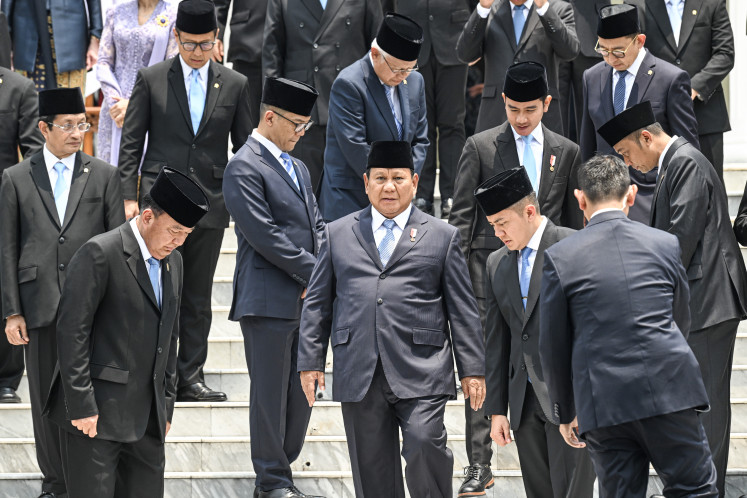Popular Reads
Top Results
Can't find what you're looking for?
View all search resultsPopular Reads
Top Results
Can't find what you're looking for?
View all search resultsGojek, Grab go head-to-head in cloud kitchen services
The rivalry between two of Asia's biggest super-apps has been taken up a notch with Grab and Gojek competing for turf in Indonesia’s food delivery market by developing cloud kitchen services
Change text size
Gift Premium Articles
to Anyone
T
he rivalry between two of Asia's biggest super-apps has been taken up a notch with Grab and Gojek competing for turf in Indonesia’s food delivery market by developing cloud kitchen services.
Singapore-based decacorn start-up Grab has since 2018 developed its cloud kitchen business, GrabKitchen, under its business unit GrabFood. Following GrabFood’s good performance in the first half of this year, it will expand the business by opening 50 outlets by the end of the year.
Meanwhile, home grown decacorn Gojek, in cooperation with India-based internet restaurant startup RebelFoods, began building cloud kitchens in July, with a plan to have 100 built within an 18 month period.
Nielsen Singapore‘s latest study on the trend in app-based food-delivery services in Indonesia shows that 95 percent of the 1,000 consumers surveyed in the last three months ordered fast food, of whom 58 percent made their orders through smartphones.
“According to the study conducted in seven major cities, most of the consumers used their smartphones 2.6 times a week to order food,” Nielsen Singapore’s executive director of consumer insight Garick Kea told reporters in Jakarta on Sept. 19.
Kea added that the market was still wide open, as 42 percent of urban consumers did not use such services. Indonesia, with 64.8 percent internet penetration and a rapidly growing number of middle-class consumers, provides a robust market for app-based food delivery services.
“Young professionals are willing to spend more money to save time and improve efficiency,” Kea said.
Currently, two major players, Gojek and Grab, which operate via their flagship brands GoFood and GrabFood, respectively, dominate the app-based food delivery market. Both are now expanding their businesses into cloud kitchen services, in the form of restaurants that accept orders online and deliver to customers’ doorsteps but do not offer dine-in facilities.
According to earlier reports, to expand its cloud kitchen business, Gojek has invested US$5 million into India-based online restaurant startup RebelFoods, which has received an injection of $125 million from Coatue Management, Goldman Sachs, Gojek and others.
“Over the next 18 months, Rebel and Gojek will build 100 Indonesian cloud kitchens dishing out biryani, pizza, Chinese food and local fave nasi goreng [fried rice],” Bloomberg reported in July.
However, Gojek has yet to announce where it will build the cloud kitchens, which will operate under the brand GoKitchen. “This service will address a concern of drivers. In the future, they can pick up orders closer to their locations,” Gojek’s chief food officer Catherine Hindra Sutjahyo said on Thursday.
Grab Indonesia’s president Ridzki Kramadibrata said that GrabFood was the company’s main pillar for the growth in Indonesia. “We are delighted to announce that we will become the biggest food delivery service in Indonesia by the end of this quarter.”
Since launching in April, GrabFood has established 10 GrabKitchens, nine of which are in Jakarta with one in Bandung, West Java. By the end of the year, GrabFood plans to build 50 cloud kitchens across Indonesia.
The plan reflects Grab’s commitment to boosting its food delivery business in Southeast Asia, following its acquisition of Uber’s Southeast Asia operation.
Grab said it would integrate Uber’s ride-sharing and food delivery business in the region under the Grab platform.
Meanwhile, Gojek seems upbeat about its plan to follow Grab, as it claims to have increased the value of the Indonesian food delivery sector to $3.7 billion in 2018 from just $0.9 billion in 2015, the year when Gojek launched GoFood.
“We are now the leader of food delivery services in Indonesia with a 75 percent market share,” said Gojek’s Catherine at the same event.
In the end, consumers will be the sole determining factor in who wins this battle, a battle that started roughly eight years ago in the classrooms of Harvard, where the competing founders once struck up a friendship.










